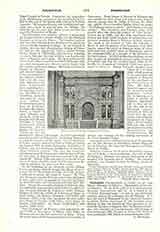www.catholic.com/encyclopedia/paleopolis


Click to enlarge
Paleopolis (PAL«ºOPOLIS), a titular see of Asia Minor, suffragan of Ephesus. The history of this city is unknown. In the sixth century it is mentioned by Hierocles (Synecdemus, 660, 4). It is found in the “Notitiae Episcopatuum“, as late as the thirteenth century, among the suffragan sees of Ephesus. It is now the town of Baliambol in the vilayet of Smyrna. Le Quien (Oriens christianus, I, 729) mentions seven bishops of this city known by their presence at the councils: Rhodon at Ephesus, 431; Basilicus at Chalcedon, 451; Eusebius at Constantinople, 536; George at Constantinople, 692; Gregory at Nicaea, 787; Peter at Constantinople, 869; Julian at Constantinople, 879.
S. PÉTRIDÉS
Enjoying this content? Please support our mission!Donatewww.catholic.com/support-us

